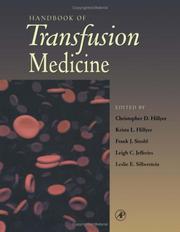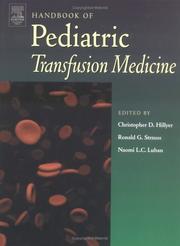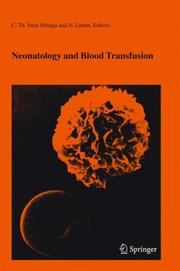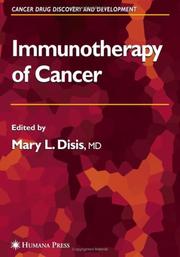| Listing 1 - 10 of 45 | << page >> |
Sort by
|

ISBN: 128103715X 9786611037154 0080533256 0123487757 9780123487759 9781429498371 1429498374 9780080533254 9781281037152 6611037152 Year: 2001 Publisher: San Diego, CA : Academic Press,
Abstract | Keywords | Export | Availability | Bookmark
 Loading...
Loading...Choose an application
- Reference Manager
- EndNote
- RefWorks (Direct export to RefWorks)
Handbook of Transfusion Medicine is unique in that it provides a comprehensive and practical description of all blood products and blood cell types currently used in transfusions, their appropriate applications, pathophysiology of conditions managed by transfusion, and pathophysiology of adverse reactions. Each chapter follows a standard format including numerous tables and algorithms, with summary elements highlighted throughout by a second-color for quick reference.Sections Include:* Blood collection and testing* Blood component description* Preparation and usage
Blood.
---
Blood--Transfusion--Handbooks, manuals, etc.
---
Transfusion.
---
Biological Therapy
---
Circulatory and Respiratory Physiological Phenomena
---
Phenomena and Processes
---
Therapeutics
---
Analytical, Diagnostic and Therapeutic Techniques and Equipment
---
Blood Transfusion
---
Blood Physiological Phenomena
---
Blood
---
Blood banks.
---
Transfusion
---
Banked blood
---
Blood transfusion service
---
Blood transfusion services
---
Tissue banks
---
Bloodmobiles
---
Body fluids
---
Fear of blood
---
Transportation

ISBN: 128100524X 9786611005245 008049143X 0123487765 9780123487766 Year: 2004 Publisher: Amsterdam ; Boston : Elsevier Academic Press,
Abstract | Keywords | Export | Availability | Bookmark
 Loading...
Loading...Choose an application
- Reference Manager
- EndNote
- RefWorks (Direct export to RefWorks)
Structured to be a companion to the recently published Handbook of Transfusion Medicine, the Handbook of Pediatric Transfusion Medicine is dedicated to pediatric hematology-oncology and transfusion medicine, a field which remains ambiguous and which has generated few comprehensive texts. This book stands alone as one of the few texts that addresses transfusion issues specific to pediatric medicine. Written in an eminently readable style, this authoritative handbook is a requirement for any pediatric physician or caregiver.* Neonatal and fetal immune response and in utero develo
Blood. --- Blood - Transfusion. --- Blood Transfusion. --- Pediatric hematology. --- Age Groups --- Biological Therapy --- Persons --- Therapeutics --- Named Groups --- Analytical, Diagnostic and Therapeutic Techniques and Equipment --- Blood Transfusion --- Infant --- Adolescent --- Child --- Medicine --- Health & Biological Sciences --- Pediatrics --- Blood --- Transfusion. --- Blood transfusion --- Blood transfusion therapy --- Hemotherapy --- Transfusion medicine --- Transfusion of blood --- Transfusion therapy --- Transfusion therapy, Blood --- Children --- Hematology --- Surgery --- Blood banks --- Blood groups --- Hospitals --- Transfusion-free surgery --- Diseases --- Transfusion committees

ISBN: 9780387236001 038723599X 9780387235998 1441936416 9786612823862 1282823868 0387236007 Year: 2005 Publisher: Netherlands : Springer,
Abstract | Keywords | Export | Availability | Bookmark
 Loading...
Loading...Choose an application
- Reference Manager
- EndNote
- RefWorks (Direct export to RefWorks)
Neonatology and Blood Transfusion Proceedings of the Twenty-Eighth International Symposium on Blood Transfusion, Groningen, NL, Organized by the Sanquin Division Blood Bank North-East, Groningen It is in many ways fitting that the last of these international symposia on blood transfusion should end with neonatal blood transfusion. The most fragile, least well studied and most at risk population requires special care and concern. We need to expand our knowledge of their unique physiology, biochemical pathways and in planning treatment and interventions, always "do no harm." This proceedings of the last Groningen symposium presents a wealth of information on developmental immunology, the molecular basis of haematopoeisis, physiological basis of bleeding and thrombosis, transfusion risks and benefits and lastly, future therapies. Infants provide us with much to learn but in turn they will be the providers of (through cord blood) and the recipients of (through cellular engineering) the best that science can offer. Translational research, which has been the thrust of these presentations for 28 years, will benefit them in a way that no scientist could have ever predicted.
Medicine & Public Health. --- Hematology. --- Blood Transfusion Medicine. --- Medicine. --- Blood transfusion. --- Médecine --- Hématologie --- Blood transfusion -- Methods -- Congresses. --- Neonatology. --- Infant, Newborn --- Blood Transfusion --- Infant --- Biological Therapy --- Age Groups --- Therapeutics --- Persons --- Analytical, Diagnostic and Therapeutic Techniques and Equipment --- Named Groups --- Hematologic Diseases --- Pathology --- Medicine --- Health & Biological Sciences --- Hematology --- Neonatology --- Neonatal pediatrics --- Haematology --- Perinatology --- Newborn infants --- Internal medicine --- Blood --- Diseases --- Blood transfusion --- Blood transfusion therapy --- Hemotherapy --- Transfusion medicine --- Transfusion of blood --- Transfusion therapy --- Transfusion therapy, Blood --- Surgery --- Blood banks --- Blood groups --- Hospitals --- Transfusion-free surgery --- Transfusion committees

ISBN: 9781588295644 1588295648 9781597450119 9786610358557 1280358556 1597450111 Year: 2006 Publisher: Totowa, N.J. : Humana Press,
Abstract | Keywords | Export | Availability | Bookmark
 Loading...
Loading...Choose an application
- Reference Manager
- EndNote
- RefWorks (Direct export to RefWorks)
Major scientific advances in molecular and clinical immunology have produced tremendous growth in our understanding of how cancer is recognized by the immune system, as well as in our ability to control and modulate that recognition. In Immunotherapy of Cancer, expert bench and clinical scientists join forces to concurrently review both the state of the art in tumor immunology and its clinical translation into promising practical treatments. The authors explain in each chapter the scientific basis behind such therapeutic agents as monoclonal antibodies, cytokines, vaccines, and T-cells, and illustrate their clinical manipulation to combat cancer. Additional chapters address statistical analysis-both of clinical trials and assay evaluations-methods for the discovery of antigens, adoptive T-cell therapy, and adaptive and innate immunity. The challenges in clinical trial design, the need for biomarkers of response-such as novel imaging techniques and immunological monitoring-and the new advances and directions in cancer immunotherapy are also fully examined. Comprehensive and cutting-edge, Immunotherapy of Cancer offers immunologists an exhaustive and authoritative survey of cancer immunotherapy, as well as providing a springboard for applying the most important findings in tumor immunology to any basic laboratory program or clinical oncology practice.
Neoplasms. --- Antineoplastic Agents. --- Immunotherapy. --- Cancer --- Antineoplastic agents --- Anticancéreux --- Design. --- Immunothérapie --- Conception --- Antineoplastic agents -- Design. --- Cancer -- Immunotherapy. --- Neoplasms -- immunology. --- Neoplasms -- therapy. --- Neoplasms --- Immunotherapy --- Immunomodulation --- Diseases --- Biological Therapy --- Therapeutics --- Analytical, Diagnostic and Therapeutic Techniques and Equipment --- Oncology --- Medicine --- Health & Biological Sciences --- Design --- Anticancer agents --- Antineoplastic drugs --- Antineoplastics --- Antitumor agents --- Antitumor drugs --- Cytotoxic drugs --- Inhibitors, Neoplasm --- Neoplasm inhibitors --- Medicine. --- Cancer research. --- Biomedicine. --- Cancer Research. --- Drugs --- Chemotherapy --- Immunological aspects --- Treatment --- immunology. --- therapy.
Periodical
Abstract | Keywords | Export | Availability | Bookmark
 Loading...
Loading...Choose an application
- Reference Manager
- EndNote
- RefWorks (Direct export to RefWorks)
Molecular genetics --- Cellular therapy --- Génétique moléculaire --- Thérapie cellulaire --- Periodicals. --- Periodicals --- Périodiques --- Biochemical Phenomena. --- Biological Therapy. --- Molecular genetics. --- Biologic Therapy --- Biotherapy --- Therapy, Biological --- Biologic Therapies --- Biological Therapies --- Biotherapies --- Therapies, Biologic --- Therapies, Biological --- Therapy, Biologic --- Biochemical Concepts --- Biochemical Phenomenon --- Biochemical Process --- Phenomena, Biochemical --- Biochemical Processes --- Biochemical Concept --- Concept, Biochemical --- Concepts, Biochemical --- Phenomenon, Biochemical --- Process, Biochemical --- Processes, Biochemical --- molecular therapy --- gene therapy --- cell-based therapy --- technology development --- drug development --- Genetics --- Molecular biology --- Molecular Biology --- Teràpia cel·lular --- Genètica molecular --- Biologia molecular
Book
ISBN: 1617284556 9781617284557 1616689692 9781616689698 Year: 2010 Publisher: New York : Nova Science Publishers,
Abstract | Keywords | Export | Availability | Bookmark
 Loading...
Loading...Choose an application
- Reference Manager
- EndNote
- RefWorks (Direct export to RefWorks)
Blood -- Transfusion. --- Burns and scalds -- Surgery. --- Blood --- Burns and scalds --- Body Fluids --- Biological Therapy --- Fluids and Secretions --- Therapeutics --- Blood Transfusion --- Anatomy --- Analytical, Diagnostic and Therapeutic Techniques and Equipment --- Medicine --- Health & Biological Sciences --- Hematologic Diseases --- Transfusion --- Surgery --- Transfusion. --- Surgery. --- Burn trauma --- Scalds --- Blood transfusion --- Blood transfusion therapy --- Hemotherapy --- Transfusion medicine --- Transfusion of blood --- Transfusion therapy --- Transfusion therapy, Blood --- Wounds and injuries --- Blood banks --- Blood groups --- Hospitals --- Transfusion-free surgery --- Transfusion committees

ISBN: 0309055466 9786610191970 128019197X 0309589509 0585155496 9780585155494 9780309055468 9780309589505 6610191972 0309175321 Year: 1996 Publisher: Washington, D.C. : National Academy Press,
Abstract | Keywords | Export | Availability | Bookmark
 Loading...
Loading...Choose an application
- Reference Manager
- EndNote
- RefWorks (Direct export to RefWorks)
MEDICAL --- Hematology --- Blood banks --- Blood --- Biological Therapy --- Biological Specimen Banks --- Safety --- Risk Management --- Organization and Administration --- Health Facilities --- Therapeutics --- Accident Prevention --- Health Services Administration --- Accidents --- Health Care Facilities, Manpower, and Services --- Health Care --- Analytical, Diagnostic and Therapeutic Techniques and Equipment --- Public Health --- Environment and Public Health --- Safety Management --- Blood Banks --- Blood Transfusion --- Medicine --- Health & Biological Sciences --- Hematologic Diseases --- Safety regulations --- Transfusion --- Banked blood --- Blood transfusion service --- Blood transfusion services --- Body fluids --- Fear of blood --- Tissue banks --- Bloodmobiles --- Transportation
Book
ISBN: 1441901698 9786612509216 1282509217 1441901701 Year: 2009 Publisher: New York ; London : Springer Science,
Abstract | Keywords | Export | Availability | Bookmark
 Loading...
Loading...Choose an application
- Reference Manager
- EndNote
- RefWorks (Direct export to RefWorks)
Cancer has surpassed heart disease as the number one killer in the world, and standard cancer therapy such as radiation, chemotherapy, and surgery may have reached its plateau in further improving the outcome of treated patients. Biological therapies combined with other treatment approaches may be the next X-factor to greatly extend survival time and improve patients’ quality of life. One of the most developed fields in biological therapy is immune therapy, which has stemmed into many branches due to its significance and the tremendous effort by a large population of scientists. Tumor-targeted antibody therapy has been successfully used for treating some types of tumors, and the first tumor vaccine against ovarian cancer has been developed for clinical application. Targeted Cancer Immune Therapy provides comprehensive coverage of novel immune therapeutic approaches, including cytokine therapy, engineered cell therapy, and the application of tumor-targeted antibodies for generating tumor-specific cell therapy, TLR ligand therapy, and cytokine therapy. In the section "Cytokine Immune Therapy," the authors review relatively new cytokine family members, such as the IL12 family, IL18, IL21, IL24, IL28, and IL29, in regard to the anti-tumor function and application in treating tumors. The strategy for targeting and retaining cytokines in the tumor microenvironment is also reviewed. The section "Cell-based Immune Therapy" focuses on reviewing "state of the art" approaches for engineering potent immune regulatory or effector cells, such as dendritic cells, T cells, and stem cells, for tumor targeting and initiation of tumor specific immune response. In the section "Targeted Immune Therapy," the authors rearticulate antibody therapy for boosting immune response, which includes immunocytokines, "T-body," and tumor targeted CpG ODN. Some or all of these innovative approaches may ultimately become effective future immune therapies for treating malignancy.
Cancer -- Immunotherapy. --- Cancer. --- Tumors -- Immunological aspects. --- Cancer --- Immunotherapy --- Methods --- Neoplasms --- Investigative Techniques --- Immunomodulation --- Diseases --- Biological Therapy --- Analytical, Diagnostic and Therapeutic Techniques and Equipment --- Therapeutics --- Oncology --- Internal Medicine --- Medicine --- Health & Biological Sciences --- Immunotherapy. --- Treatment. --- Cancer therapy --- Cancer treatment --- Therapy --- Medicine. --- Cancer research. --- Pharmacology. --- Biomedicine. --- Cancer Research. --- Pharmacology/Toxicology. --- Drug effects --- Medical pharmacology --- Medical sciences --- Chemicals --- Chemotherapy --- Drugs --- Pharmacy --- Cancer research --- Clinical sciences --- Medical profession --- Human biology --- Life sciences --- Pathology --- Physicians --- Physiological effect --- Immunological aspects --- Treatment --- Oncology. --- Toxicology. --- Pharmacology --- Poisoning --- Poisons --- Tumors --- Toxicology
Book
ISBN: 3540312056 9786612068423 1282068423 3540312064 Year: 2009 Publisher: Berlin : Springer,
Abstract | Keywords | Export | Availability | Bookmark
 Loading...
Loading...Choose an application
- Reference Manager
- EndNote
- RefWorks (Direct export to RefWorks)
Gliomas, which comprise astrocytic, oligodendroglial, and ependymal lesions, are the most frequent primary intracranial tumors. This volume summarizes the enormous advances in our knowledge of gliomas that have occurred during recent years. The first part of the book focuses on the glial tumor entities, with detailed discussion of diagnosis, molecular genetics, and tumor origin. This section also contains a chapter on hereditary tumor syndromes associated with gliomas and the molecular mechanisms underlying these specific diseases. The second part is devoted to the clinical management of gliomas and provides insights into novel developments regarding neuroimaging, surgical management, radiation therapy, adjuvant therapy, experimental approaches, and the neurotoxicity of treatment. The final part of the book addresses angiogenesis and epigenetic regulation of gene expression in gliomas.
Gene therapy. --- Glioma. --- Gliomas. --- Medicine. --- Nervous system. --- Neurology. --- Oncology. --- Gliomas --- Neoplasms, Neuroepithelial --- Biological Therapy --- Analytical, Diagnostic and Therapeutic Techniques and Equipment --- Therapeutics --- Neoplasms, Glandular and Epithelial --- Neuroectodermal Tumors --- Neoplasms, Nerve Tissue --- Neoplasms, Germ Cell and Embryonal --- Neoplasms by Histologic Type --- Neoplasms --- Diseases --- Gene Therapy --- Glioma --- Diagnosis --- Medicine --- Health & Biological Sciences --- Oncology --- Nervous system --- Tumors. --- Neurosurgery. --- Medicine & Public Health. --- Nerves --- Neurosurgery --- Neuropsychiatry --- Tumors --- Clinical sciences --- Medical profession --- Human biology --- Life sciences --- Medical sciences --- Pathology --- Physicians --- Surgery
Book
ISBN: 1441961011 1461426340 144196102X 1299196799 Year: 2010 Publisher: New York : Springer,
Abstract | Keywords | Export | Availability | Bookmark
 Loading...
Loading...Choose an application
- Reference Manager
- EndNote
- RefWorks (Direct export to RefWorks)
Cancer gene therapy is a novel therapy that targets the underlying genetic defects in the cancer cell. Progress in this field has been rapid and gene therapy promises to further extend personalized cancer treatment. In this volume leading experts have contributed their experience in developing gene therapies for a variety of cancers. Translational gene therapy approaches are emphasized. Chapters include discussions of specific gene delivery technologies as well as their application to various cancers with extensive discussions of ongoing clinical trials. This information should be useful to students, fellows, clinical investigators, and experienced scientists with an interest in this rapidly developing area.
Cancer -- Gene therapy. --- Gene therapy. --- Neoplasms -- Therapy. --- Cancer --- Methods --- Gene Therapy --- Neoplasms --- Diseases --- Genetic Engineering --- Biological Therapy --- Investigative Techniques --- Genetic Techniques --- Therapeutics --- Analytical, Diagnostic and Therapeutic Techniques and Equipment --- Oncology --- Medicine --- Health & Biological Sciences --- Gene therapy --- Medicine. --- Cancer research. --- Pharmacology. --- Biomedicine. --- Cancer Research. --- Pharmacology/Toxicology. --- Genetic aspects --- Treatment --- Oncology. --- Toxicology. --- Chemicals --- Pharmacology --- Poisoning --- Poisons --- Tumors --- Toxicology --- Drug effects --- Medical pharmacology --- Medical sciences --- Chemotherapy --- Drugs --- Pharmacy --- Cancer research --- Physiological effect
| Listing 1 - 10 of 45 | << page >> |
Sort by
|

 Search
Search Feedback
Feedback About UniCat
About UniCat  Help
Help News
News